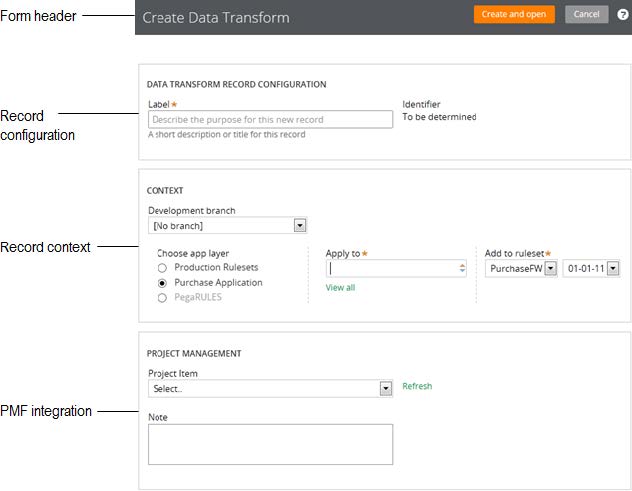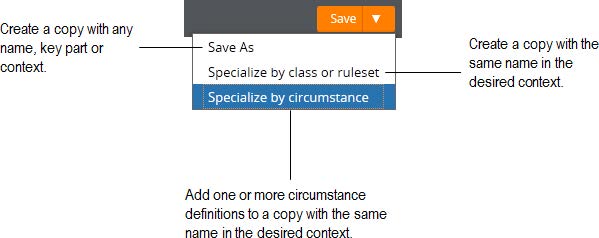Text predictions simplify the configuration of text analytics for conversational channels
Valid from Pega Version 8.6
Enable text analytics for your conversational channels, such as email and chatbot, by configuring text predictions that manage the text models for your channels. This new type of prediction in Prediction Studio consolidates the AI for analyzing the messages in your conversational channels in one place and replaces the text analyzer rule in Dev Studio.
Through text predictions, you can efficiently configure the outcomes that you want to predict by analyzing the text in your channels:
- Topics (ticket booking, subscription cancellation, support request)
- Sentiments (positive, neutral, negative)
- Entities (people, organizations, airport codes)
- Languages
You can train and build the models that predict these outcomes through an intuitive process, and then monitor the outcomes through user-friendly charts.
For more information, see Predict customer needs and behaviors by using text predictions in your conversational channels.
Upgrade impact
Channels that you configured with text analyzers in the previous version of your system continue to work in the same manner after the upgrade to the current version. When you edit and save the configuration of an existing channel, the text analyzer rule is automatically upgraded to a text prediction. The associated text prediction is now an object where you can manage and monitor the text analytics for your channel. When you create a new channel in the upgraded system, the system automatically creates a text prediction for that channel.
What steps are required to update the application to be compatible with this change?
- Enable the asynchronous model building and reporting in text predictions through job schedulers that use the System Runtime Context (SRC) by adding your application to the SRC.
For more information, see Automating the runtime context management of background processes. - Enable model building in text predictions by configuring background processing nodes.
For more information, see Assigning decision management node types to Pega Platform nodes.
Upgrading to Hazelcast 4.x requires downtime during upgrades to Pega Infinity 8.6
Valid from Pega Version 8.6
Upgrade impact statement
On-premises upgrades of Pega Infinity release 8.4.2 and later to version 8.5.1 or later on Tomcat and PostgreSQL are completed with near-zero downtime. However, upgrading to Hazelcast 4.x requires that you shut down and restart your application server.
What is required to update the application to be compatible with this change?
Hazelcast 3.x is enabled by default. For near-zero downtime upgrades, you do not need to perform any action.
For instructions about upgrading to Hazelcast 4.x, see one of the following topics:
- For near-zero downtime upgrades from Pega Infinity release 8.4.2 or later on Tomcat and PostgreSQL, see "Optional: upgrading to Pega Platform version 8.6: Upgrading to Hazelcast 4.x" in Near-zero downtime Upgrade Guide for Pega Platform version 8.4.2 and later for Tomcat and PostgreSQL.
- For all other upgrades, see "Optional: upgrading to Hazelcast 4.x" in the appropriate upgrade guide.
Extend PegaUnit setup and cleanup capabilities using custom fixtures
Valid from Pega Version 8.6
The set up and clean up capabilities in the PegaUnit framework are now customizable through the use of custom fixtures. Custom fixtures extend the default testing functionality and allow you to define and implement specific runtime actions, such as running a specific test case during set up or sending an email after testing has completed execution.
For more information, see Setting up and cleaning the context for a test case or test suite.
Kafka data set enhancements
Valid from Pega Version 8.6
The Kafka data set is a high-throughput and low-latency platform for handling real-time data feeds that you can use as input for Pega Platform event strategies.
For better integration of Pega Platform with externally hosted Kafka, the following enhancements are implemented:
- Support for Kafka message keys and headers - extended values data format (JSON Data Transform, Apache Avro)
- Custom value processing
- Configuring topic names by using Application Properties
- Data-Admin-Kafka enhancements - supporting a wide range of connection properties
For more information, see Improve your Kafka data set with new enhancements.
External data flow rules are removed
Valid from Pega Version 8.6
In previous versions of Pega Platform™, you could configure data flows to run in an external Hadoop environment. The external data flows functionality was deprecated and hidden from view in Pega Platform 8.5. The functionality has been now removed and is no longer available in Pega Platform 8.6.
For more information, see External data flow rules are deprecated.
Improved indexing of StringList and StringGroup property types
Valid from Pega Version 8.6
Search and Reporting Service in Pega Platform™ 8.5 may improperly index StringList and StringGroup property types. As a result, the data model does not include the affected properties.
Upgrade impact
After upgrading to Pega Platform version 8.6, the system requires that the classes with the StringList or StringGroup type are reindexed.
What steps are required to update the application to be compatible with this change?
On the Search Landing Page, manually reindex all the classes that include properties with the StringList or StringGroup types to ensure that all your data is present in the data model. Alternatively, if finding specific instances of classes is difficult, you can reindex all classes in your application.
For more information, see Indexing class data.
Naming pattern changed for file data sets
Valid from Pega Version 8.6.3
File data sets are used to import from and export data to a file repository. In case of data export, prior to version 8.6.3, the first file exported had the same file name that was provided by the user in the data set, and any subsequent file exported to the repository had a unique identifier appended to it. Starting in Pega Platform version 8.6.3, each file has a unique identifier, automatically generated based on the data flow node, thread ID, and timestamp.
Upgrade impact
If your process to consume output files expects files with a specific name, it may not be able to process the resulting files correctly.
What steps are required to update the application to be compatible with this change?
If you have configured the process before updating to Pega Platform version 8.6.3, but the exported files are no longer recognized by downstream processing logic after the upgrade, ensure that the downstream tool is configured to recognize the files by a pattern rather than the full name. For example, when referring to files exported to the repository, use the * character to indicate a pattern instead of using the full file name. For example, use Export*.csv to refer to the files.
Facebook and YouTube data sets are deprecated
Pega Platform™ no longer supports the data set types in the Social category:
- Facebook data sets
- YouTube data sets
These features are deprecated and will be removed in future Pega Platform versions. Do not create any data sets using the Facebook or YouTube types.
Create, Save As, and Specialization forms
Valid from Pega Version 7.1.4
The familiar “New” and “Save As” forms have been streamlined to make record creation faster and more intuitive. You can easily target a specific layer in your application stack, interactively define the record’s configuration and select only those circumstance definitions that make sense for your use case.
While the underlying behavior for creating a record is not new for this release, the redesigned UI of these forms and new defaulting strategy for fields is worth noting:

To launch these forms, use one of the new options found in the action area of the form header:

Note that not all record types support the ability to specialize by circumstance.
For more guidance on how to use the Create, Save As and Specialization forms, please refer to: Intuitive record creation and specialization
Redirect users to logout screen
Valid from Pega Version 7.1.4
New applications built in Version 7.1 will automatically redirect users to the PRPC login page upon logout.
A new template, Web-Session-Return-Template, has been added, to allow developers to customize their applications to redirect users to a logout page, if they wish. This template can be copied to a ruleset visible to unauthenticated requestors (via node configuration) and used to override Web-Session-Return.

